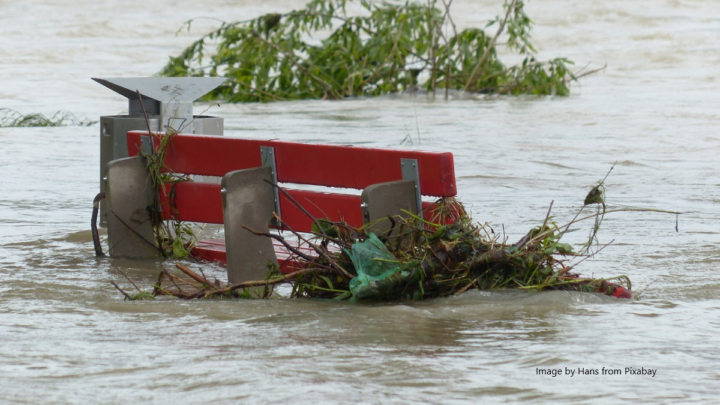Love expressed in tangible forms are is a testimony, not only to those who receive it, but to those who witness it. The United Methodist Church has a long history of coming to the aid of persons experiencing
UMCOR, VIM and local church work teams all play a role in this witness.
I realize I am writing this article at the end of a sunny, low humidity weekend. For a late summer weekend, the weather seemed just about perfect. While the Corridor District largely enjoyed seemingly perfect weather, the news reminded us all of dangerous weather elsewhere. In fact, Patty’s sister sent a video.
This isn’t a call to run to the store to purchase bread and milk. However, it is an invitation to begin preparing
RESPONDING TO THE NEED IN Kentucky
Responding and Preparing
As Patty and I took a deep breath and relaxed on Sunday evening we remarked on the beautiful weather over the weekend. Sunny with low humidity is a surprising gift in the latter days of summer. Not long after we had that conversation, Patty received a text and video from her sister in Iowa. They had returned from a fishing trip in Minnesota, only to discover a severe storm had swept across their farm and demolished a 300 foot shed. While they were happily enjoying a family gathering, their home was being assaulted by high winds. Of course, even in the midst of our good weather, there were plenty of stories on the news where other places in the nation and the world were experiencing the harsh and harmful effects of weather events.
The truth is that there are fierce and uncontrollable forces in nature. While severe weather and natural disasters don’t happen often (though it seems they are becoming more frequent), they do occur. Reaching out and helping our neighbors in times of tragedy is a tangible expression of God’s love. Through our response, the church becomes a living testimony of Christ’s compassion not only to the people who are assisted, but to those who witness our work. Certainly the gospels record Jesus reaching out to people in need so that they may experience God’s healing and restorative power.
While anyone can “rise to the occasion” when a disaster strikes, we are more focused, thorough and effective if there is a plan. For this reason, I’d like to highlight some things that local churches and members can do, both individually and collectively, to respond well to needs as they arise. I am listing them in reverse order (responding before preparing) given what has occurred in Kentucky.
Responding
UMCOR Donations: The United Methodist Committee on Relief has a track record of being one of the first organizations into a stricken area and one of the last to lead. UMCOR donations go directly to help the people who are affected by a disaster.
If you desire to respond to the severe flooding in Kentucky, donations can be sent to:
The Kentucky Annual Conference of The United Methodist Church
Disaster Response Ministry Fund
Attn: Treasurer
7400 Floydsburg Road
Crestwood, KY 40014.
Please note “Disaster Response: Advance 200902” on your check.
UMCOR Kits: Whether done by individuals or a congregational day of mission, UMCOR kits provide much-needed supplies that are easily distributed. You can follow this link to find how to prepare several different types of kits: https://nccumc.org/disaster/kits/.
NOTE: All Saints United Methodist Church has agreed to be a collection center for UMCOR kits. Their address is: 120 Smallwood Drive, Morrisville, NC 27560. Contact information: Phone – 919-321-2648; Email – [email protected]
Work Teams: After the assessment phase and with the invitation of local leaders, work teams are welcome and needed to assist in the recovery efforts. There are a variety of needs in areas that have experienced a disaster and so a variety of gifts are necessary, from general construction knowledge to a caring spirit, or from physical strength to a listening ear. While Kentucky is not yet ready for work teams at this time, please be ready when the invitation comes.
Preparing
ERT (Emergency Response Teams) are specially trained groups that are given access to disaster areas for the purpose of assessment. Training can happen specifically for a local church or in gatherings of several churches. If you are interested in a training event, you can contact Marty Hunicutt at [email protected] or Jim Polhamus at [email protected].
Church Disaster Plan: It is important that each local congregation have a disaster plan in place. But where to begin? The Conference Disaster Ministries Team has created a template that helps churches gather information and create their own plan. While it can be modified to suit local needs, the template is a great place to start. The link is: https://nccumc.org/disaster/wp-content/uploads/sites/35/2022/07/local-church-disaster-plan-template.pdf
Personal Disaster Plan: Since none of us know when we will experience a disaster, it is good to develop a plan in advance. The congregational template provides a good framework as you gather information for your own plan.
Marty Hunicutt is the Corridor District Disaster Response Coordinator and can be reached at
[email protected] or 919-616-5247.
A quick guide for what to do when disaster strikes can be found at this link – What to Do When Disaster Strikes

